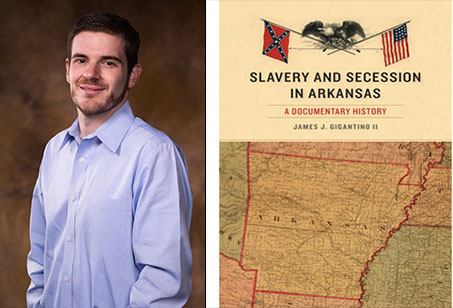FAYETTEVILLE, Ark. — A new book that examines private and published documents in Arkansas before the start of the Civil War reveals that defending slavery was at the forefront of secession arguments in the state.
Slavery and Secession in Arkansas: A Documentary History, draws from hundreds of sources, including pamphlets, broadsides, legislative debates, public addresses, newspapers and private correspondence.
At the dawn of the Civil War, slavery was growing faster in Arkansas than almost everywhere else in the United States. In 1860, one-fourth of the state’s population was in bondage.
James Gigantino, a historian at the University of Arkansas who edited the book, said the doctrine of “state’s rights” – often argued as one of the primary causes of the Civil War – also showed up in the documents alongside slaveholding rights.
“But Arkansas’ political actors were more interested in the state’s right to hold slaves more than anything else,” Gigantino said. “In almost every circumstance the political actors were arguing that Arkansas needed to take secession seriously, and the perceived threat that Abraham Lincoln and the Republican Party presented to slavery.”
An example of a pro-secession resolution linking slaveholding and states’ rights was from Hempstead County, where slaves represented about 40 percent of the county’s population.
Dated Dec. 24, 1860, the resolution includes the clause, “Resolved, that the institution of slavery, as it exists in the present slaveholding States of this Union, is a constitutional right, secured and recognized by the Constitution of the United States … and that it is the duty of the Congress of the United States to protect this right of property in such slaves in all the common territory belonging to the United States …”
Hempstead County is in the southwest corner of the state. Arkansas’ geography also influenced debates between pro-secessionist Arkansans and those who wanted to remain in the United States, often referred to Unionists.
“Those representing the interests of the state’s largest slaveholding counties in eastern and southern Arkansas were more apt to support secession because they thought the federal government was a threat to their livelihoods,” Gigantino said. “But most political representatives in northern Arkansas, where there were relatively few slaves, were not as interested in secessionism to protect slavery.
“But even in those areas, those Unionists thought the best path to protecting slavery was staying in the Union,” he said.
Gigantino is an associate professor of history in the J. William Fulbright College of Arts and Sciences at the U of A. An affiliated faculty member of the African and African American Studies program in Fulbright College, Gigantino is the author of the 2014 book The Ragged Road to Abolition: Slavery and Freedom in New Jersey, 1775-1865, and editor of The American Revolution in New Jersey: Where Battlefront Meets the Home Front, which was published earlier this year.
Slavery and Secession in Arkansas is published by the University of Arkansas Press as part of its Civil War in the West Series.
About the University of Arkansas Press: Founded in 1980, the University of Arkansas Press is an academic publishing house that is part of the University of Arkansas. A member of the Association of American University Presses, it has as its central and continuing mission the publication of books that serve both the broader academic community and Arkansas and the region.
About the University of Arkansas: The University of Arkansas provides an internationally competitive education for undergraduate and graduate students in more than 200 academic programs. The university contributes new knowledge, economic development, basic and applied research, and creative activity while also providing service to academic and professional disciplines. The Carnegie Foundation classifies the University of Arkansas among only 2 percent of universities in America that have the highest level of research activity. U.S. News & World Report ranks the University of Arkansas among its top American public research universities. Founded in 1871, the University of Arkansas comprises 10 colleges and schools and maintains a low student-to-faculty ratio that promotes personal attention and close mentoring.
Contacts
James Gigantino, associate professor, Department of History
J. William Fulbright College of Arts and Sciences
479-575-7332, jgiganti@uark.edu
Chris Branam, research communications writer/editor
University Relations
479-575-4737, cwbranam@uark.edu
